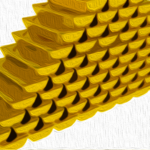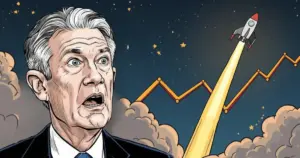Lightning and Bitcoin are two technologies that have the potential to revolutionize human communication and information sharing.
This opinion editorial is by Patrick McCaughey. Patrick McCaughey is a Bitcoin advocate, live music enthusiast, and pragmatist who lives in western Massachusetts.
Humans are naturally social creatures. We share meals, have conversations, and, when it is time, let our souls go and allow the flow to take over. After all, we are just swimming in the real thing that is life. Technology is changing rapidly and the ways we communicate and share information is also changing. Although our journey is short, we have made a lot of progress in the past few decades thanks to technological advances. These innovations open up new avenues for connecting with fellow humans. New ways to exchange ideas, store information and transfer value are breaking down the old systems that have been too limiting. If we can envision it, we can make it. And if we are able to build it correctly, we can create a world that values fairness, truth and an opportunity for an equitable future. However, this bullish sentiment is based on a large assumption: that we will have constant access to wireless communication via an efficient and decentralized network.
Friday, July 23 was my 64th Phish show. Bethel Woods Center for the Arts, Bethel, NY was the venue. Bethel is best known for hosting the Woodstock Festival, which was the biggest music festival of modern history. It attracted an estimated 400,000+ people (or so Trey Anastasio). This area is rich in cultural history and the surroundings are as beautiful and stunning as you can imagine. Although it has been over 50 years since the event, it felt like it had not changed at all. This largely rural community in the Catskills is still not connected to the city at the same speed, for better or worse.
Although it was unexpected, I didn’t think this would be a problem. In 1969, there weren't any mobile communication devices and they did just fine. Then I started to think about the logistics of the night ahead and how our society is becoming more dependent on constant internet access to participate. Lyft and Uber, Instagram, Twitter and SMS messages — all these services will soon be less usable. Although we were able to book our Lyft using the hotel's WiFi, when it was time to get a ride back, we didn't expect to be able to use any of the modern apps to book a return trip, much less call a taxi.
Phish Lot: Last Unfettered Market
We were immediately greeted upon leaving the show with subtle sounds and scents, such as colors in the area and the textures of the town. Hot butter was melting on a grill and a crisp '77 'Eyes of the World was roaring out of a vendor's speaker. The whirring hiss of Nitrous oxide seemed like it was covering our entire body. The vagabond gas salesman announced, "One for $10, three to $20, ice-cold!" While some people lined up to happily give his asking price, others tried to negotiate. "How about four for $20?" No? No.
This is price discovery at its best. There are market dynamics taking place on Phish Lot that are grounded in first principles and pragmatism. Although they may not be the best way to approach all things, free markets are certainly efficient. This was an unadulterated spot-market, there were no calls, puts, or leverage, and it was all we wanted. After saying goodbye to a few of our friends and enjoying a few balloons, we made our way to the exit to catch a ride back home to our hotel. After what seemed like an eternity, Catskill Mountain Transportation arrived and offered a taxi service. The taxi company arrived and started taking us to the various campgrounds and hotels. We finally made it back to our hotel, where we could relax and start the next day.
It was clear that the network problems I encountered last night highlighted a crucial point: a hyperbitcoinized society will not be possible until Internet outages cease to exist. It doesn't necessarily mean that Bitcoin is failing us. We just need to find ways to make sure we have reliable methods for high-range wireless communication. Bitcoin can only be a global reserve currency if it has uninterrupted internet access that is as widespread as human life. If not, we are brain dead and made up of money. No future.
Mesh Networks Give Back the Internet
Mesh networks are a very old technology. The military has used them for years to maintain constant communication in areas that are not equipped with satellite or wired service. Although the technology required to build such a network is simple, it has not been necessary due to the rapid construction of wireless cell towers. In 2000, the United States had 104,288 active towers. In 2020, the number had risen to 417,215.
Source Statista
American Tower is one of the most important tower operators. They claim that their global portfolio contains approximately 222,000 communication sites. This includes more than 43,000 properties in America and Canada, and nearly 179,000 properties worldwide. While this infrastructure is an asset, it is far from the peer-to-peer permissionless society we long to live in.
The 2018 blog post Understanding Mesh Networking Part 1 by Ram Ramanathan (GoTenna Chief Scientist) describes mesh networks in the following:
A wireless mesh network is a collection of devices, often called nodes, that communicate with one another using peer-to–peer wireless links. This means that a message is bounced from one device to another, landing at a third, or fourth, and so on. This network is also decentralized and infrastructure-less, so it doesn't need to have a lot of resources backend. Also, no one node has priority.
Do you sound familiar? Mesh networks work on the same principles as the Lightning Network. Although I appreciate Ramanathan's concise definition of a mesh network, and believe GoTenna has made significant progress in this area, being obligated to a counterparty that can/will leak your personal data is antithetical the whole point of this technology. It is obvious that companies such as GoTenna do not consider themselves to be friends. Regardless of whether it's true that In-Q-Tel, the CIA's venture capital department, funded GoTenna, it's a closed platform that discourages innovation and development. They are also clearly more concerned with maintaining government contracts than they are helping the average citizen.
Instead of repeating what I have already written in this space, let me refer you to "Making Bitcoin unstoppable Part One" by L0laL33tz. L33tz provides a comprehensive overview of the history of mesh networks used for Bitcoin transactions. This includes both Lightning transactions and transaction on-chain via Blockstream Satellite. It also outlines the technical process to create these using non-dedicated hardware. Mesh networks will likely increase in popularity over the next decade, as many factors, including a decrease in hardware costs, citizens becoming more skeptical about their governments' ability, and the drive for last-mile internet connectivity for everyone, would not surprise me.
Lighting On Lot
Since its inception, Phish has been closely associated with counterculture. Since the beginning of Phish's history, there has been a growing microeconomy on tour. A multitude of unofficial vendors offer food, drinks, clothing, intoxicants, and art for sale before and after shows. These nomadic sellers used cash to pay for their goods for decades. However, as digital transactions have become more popular, people are increasingly accepting Venmo and Cash App. This is a great way to make transactions easier for both the seller and buyer, but it has its downsides.
These applications have a KYC component. However, chargebacks are still possible. A chargeback is a way to revoke funds that a seller received after a Venmo/Cash App payment has been made. This can cause problems for merchandisers who rely on the funds to buy supplies for their next show. These vibrant gray markets could not sustain themselves if they don't have the funds to replenish their propane tanks or stock up on ingredients for grilled cheese sandwiches.
As CBDCs become a reality, it is up for us collectively to make sure that a censorship-resistant, immutable, and open monetary network is available to everyone. We risk being trapped in a dystopian future where authorities can monitor and stop transactions. To be clear, I do not condone money laundering, illicit activity or any other form of money laundering. I propose that, as we move away form a cash economy we preserve the properties of cash, which allow for private, unsurveilled transactions.
Lightning Network adoption is growing at an amazing rate. The Lightning Network's capacity reached 4,000 BTC on July 1, 2022. This equates to more than $77 million in value across all channels. This number represented less than $10million in value two years ago, when it was just 1000 coins. It is a common saying that everything happens slowly, then suddenly, and then all at once. Although the technology is still in its infancy, there are obvious benefits to transacting via the Lightning Network. This fact is even being embraced by bankers. Researchers at the Federal Reserve Bank of Cleveland published a paper entitled "The Lightning Network" earlier this summer. It highlighted the benefits of Lightning adoption, including instant settlement, low fees, and a reduction in congestion on the Bitcoin timechain.
Today, many people need Bitcoin. Bitcoin is an economic lifeboat to people who are oppressed by authoritarian regimes that live with double-digit inflation. Many stories have been told of people using Bitcoin to gain freedom in countries such as Nigeria, Sudan, and Ethiopia. People who are part of a band that sells beers and grilled cheese sandwiches to the country with the global reserve currency status won't require Bitcoin the same way as people in Turkey where the local currency is melting. Phish's success is not dependent on Bitcoin or the Lightning Network. It doesn't even need Bitcoin, at least not today. There are very few communities who have the will, knowledge, and tenacity to embrace this new technology in a meaningful and effective way that will be ingrained into our culture.
Digital Music to Digital Money
The early adopters of tech have been a hallmark of Phish fans. The tape trading community that was started by the Grateful Dead spread to Phish. These '90s geeks, who obsess over live recordings of the band, were undoubtedly a key catalyst for the digital revolution in music. Tapes were a key component of the audio revolution. As media formats improved, they led to CDs and then more affordable CD-Rs/CDWs. These live music lovers initially used the internet to connect and find each other, but the actual media was still physical up until the late 1990s. If you were interested in obtaining a copy a certain recording, but you didn't have any shows to trade, you would need find someone advertising it in their collection via a forum. Send a message and engage in "B&P" (blanks, postage). The show would be provided free of charge by a collector or taper as long as they sent blank CDs and return postal mail.
This worked well enough. However, there was a push within the community of persistent tapers and traders for their recordings to be made available online. Although this idea was first discussed in 1996, it was impossible to realize because of the slow internet speeds and large file size. The exponential growth in internet adoption was key to cracking the metaphorical nut. Statisa reports that the percentage of Americans using the internet increased from 14% in 1995, to 46% five years later as the year 2000 approached. The chart shows that this was the greatest increase in internet users over five years in the history. Tapers saw the benefits of their craft and internet access grow, and File Transfer Protocol servers (FTP) became more popular. In 1998, etree was born, a digital file sharing community that allows users to upload lossless audio files to the internet. Although it was slow at first, this led to Napster, a short-lived file sharing community that allowed users to share audio files over the internet. Today, many people have access to Apple Music and Spotify. Today, nearly a quarter century later, physical albums make up less than 10% of all music consumed in the United States.
A new monetary paradigm will not happen overnight, just as with the digital audio revolution. It's funny how technology changes. One day, a device appears and people begin using it. Then it suddenly becomes part of everyday life. As a tech-savvy person, I can recall the date the first iPhone was released: June 29, 2007. At a backyard party in Oakland, someone was just returning from the Apple Store with a shiny new 21st-century marvel. They were eager to show off their new gadget. As we gazed at a new age in information access, all the guests were stunned. It was rare to see someone with one these tiny supercomputers over the next few years, and many prefer the Blackberry or flip phones. In what seemed like an instant transformation, smartphones became part of daily life. The world's total number of smartphone users is now 6.648 billion, or 83% of the population. This is quite remarkable considering the fact that the first iPhone was launched in Cupertino 15 years ago.
Bitcoin is objectively better than government-issued dollars when it comes to saving or spending. Bitcoin is the FLAC of the.mp3 fiat currency for audiophiles. Bitcoin is like lossless audio, which cannot be degraded. It has enabled us humans to express, transfer and store value in a way that is truly amazing for our species. We should all care about how much time and energy we spend as individuals and collectively. We should demand that we can transact with a currency that isn't subject to corruption and that doesn't favor any one participant. Blockware predicts that 10% of the world's population will use Bitcoin by 2030. It remains to be seen if this prediction is true, but it may be worth getting ready for the transition now, rather than waiting. The dollar is in decline and the oligarchy are doing everything possible to keep control of the money. This doesn't necessarily mean that we are headed for a de facto dystopian future.
There are many things you can do now in order to better prepare yourself for the future. Do you want to learn more about Bitcoin Core? Run a full node. Are you a sat owner and would like to provide Lightning liquidity? Open Lightning Channels. Are you concerned about wireless communication in a decentralized, immutable way? Establish a mesh network. Do you value discrete transactions. Learn how to use Bitcoin privatelly. Are you a developer? Lightning is the best platform for developing. Are you a small-business owner? Accept Bitcoin. These small, but powerful actions can help us shape our reality to decrease economic friction and ensure self-sovereignty. It also sends a strong message to future generations: Keep the important things and know your friends.
This guest post is by Patrick McCaughey. The opinions expressed here are not necessarily those of BTC Inc. and Bitcoin Magazine.
—————————————————————————————————————————————————————————————–
By: Patrick McCaughey
Title: Phish Lot, Rural America And The Lightning Revolution
Sourced From: bitcoinmagazine.com/culture/phish-lot-rural-america-and-lightning
Published Date: Thu, 15 Sep 2022 00:00:00 GMT
















